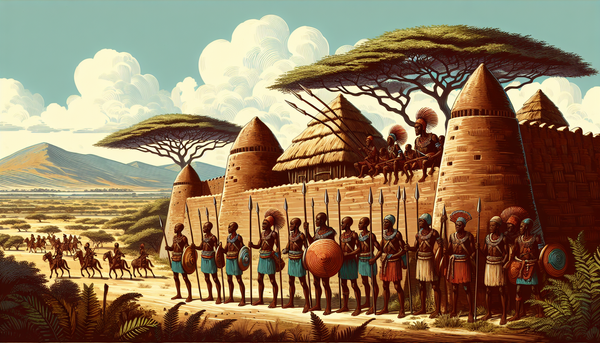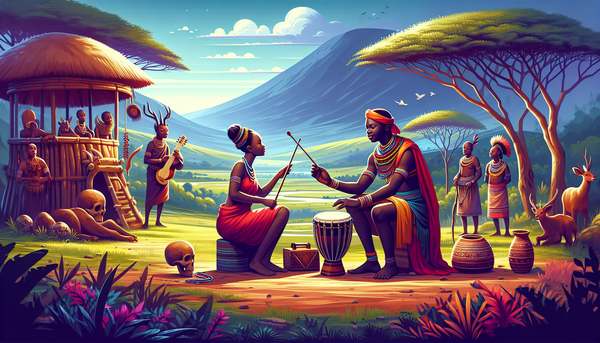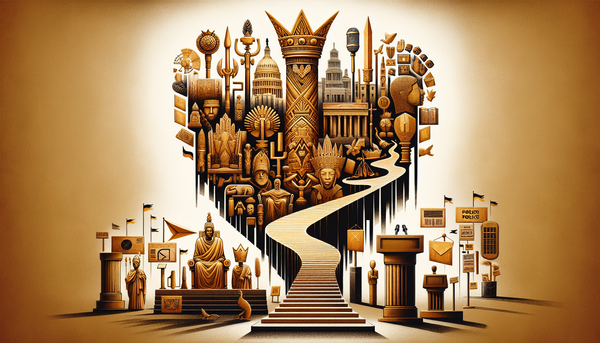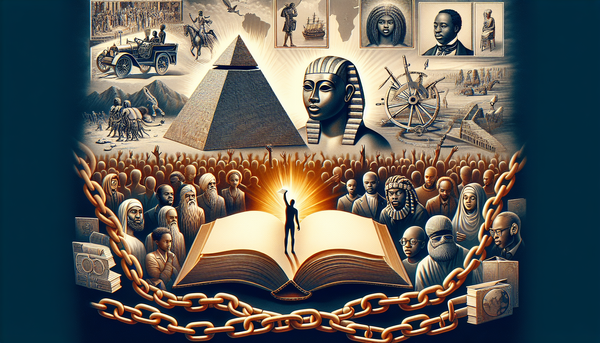The Transition from Traditional to Modern African Societies
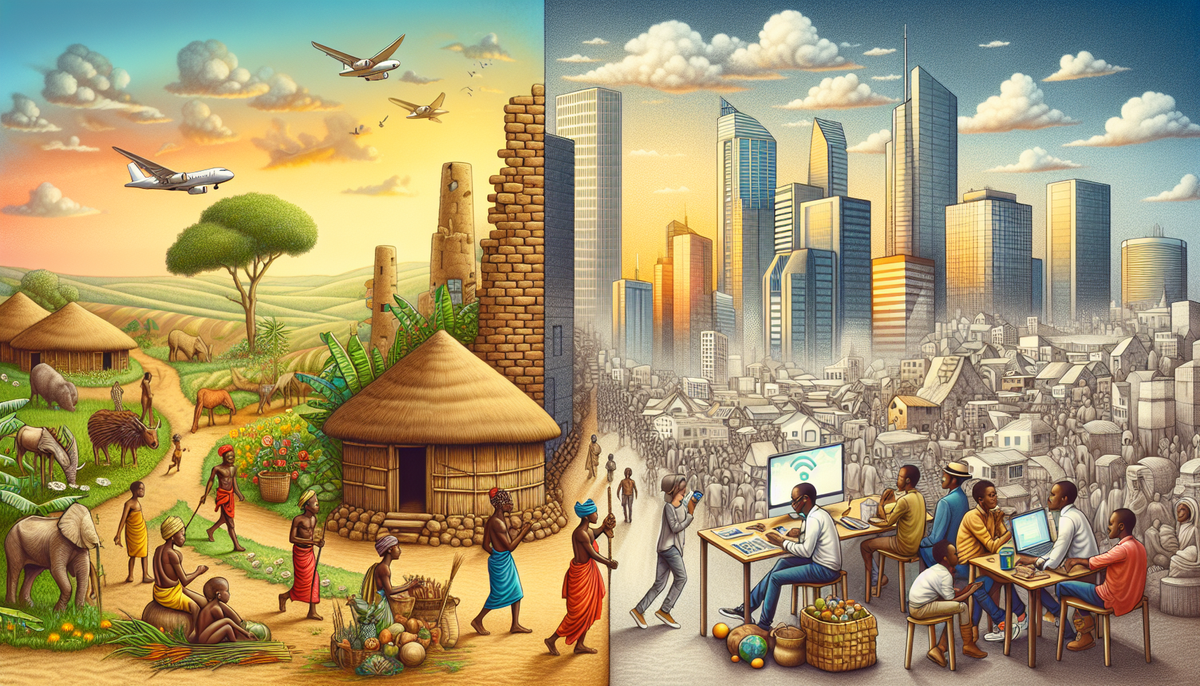
Cultural Evolution in African Societies
The cultural evolution in African societies is a dynamic process that reflects the continent's rich diversity and history. Over the centuries, traditional practices, languages, and belief systems have transformed significantly due to various influences, including colonization, globalization, and migration. As communities adapt to changing environments, cultural practices either evolve or risk fading away.
In many regions, traditional art forms such as music, dance, and storytelling remain vibrant, reflecting local identities while also incorporating modern elements. For instance, genres like Afrobeats and Amapiano illustrate how contemporary music is rooted in traditional rhythms yet appeals to a global audience.
Moreover, the rise of technology and social media platforms has enabled African cultures to gain international visibility. Young creators are merging traditional motifs with modern aesthetics, leading to a fusion that resonates with both local and global audiences.
While modernization brings new opportunities and challenges, it also raises significant questions about cultural preservation. Many communities strive to maintain their heritage, recognizing that their identities are intricately tied to their shared histories and practices. This evolving cultural landscape highlights the resilience of African societies and their capacity to adapt while honoring their ancestral roots.
Impact of Colonialism on African Traditions
Colonialism profoundly reshaped African traditions, leaving a lasting imprint on the continent's cultural landscape. European powers imposed their political, economic, and social structures, often disregarding and undermining indigenous systems. Traditional governance, social hierarchies, and community practices were disrupted, leading to the erosion of local authority and cultural identity.
Religious beliefs experienced significant transformation, as colonialists introduced Christianity and Islam, often positioning them in opposition to indigenous spiritual practices. Many African communities found their traditional ceremonies and rituals marginalized or outright banned. This spiritual conflict resulted in the blending of old and new beliefs, creating unique syncretic practices but also causing tensions among different groups.
Economically, colonial powers exploited Africa’s resources, fundamentally altering local livelihoods. Traditional economies based on subsistence farming and barter were replaced or supplemented by cash crops and wage labor, leading to significant shifts in social structures and gender roles within communities.
Despite these challenges, many African societies have demonstrated remarkable resilience, adapting elements of colonial culture while striving to retain their heritage. Today, there is a resurgence of interest in traditional practices, languages, and arts as communities seek to reclaim their identities and assert their cultural narratives in a post-colonial context. This ongoing struggle illustrates the complex legacy of colonialism and the enduring strength of African traditions.
Technology Advancement and Social Change
The rapid advancement of technology has catalyzed significant social change across Africa, transforming the ways communities interact, communicate, and conduct their daily lives. Access to mobile phones and the internet has revolutionized communication, allowing individuals to connect instantly across vast distances. This connectivity has spurred the rise of social media platforms, enabling the sharing of ideas, culture, and information in unprecedented ways.
E-commerce and digital banking have emerged as powerful tools for economic empowerment, particularly in rural areas where traditional banking services were previously limited. Platforms like M-Pesa have demonstrated how mobile technology can enhance financial inclusion, allowing individuals to manage their finances more effectively and participate in the broader economy.
Moreover, technology has played a crucial role in education, providing resources and opportunities for learning that were once inaccessible. Online courses and educational apps have expanded the reach of knowledge, helping to bridge gaps in educational disparities.
However, the digital divide remains a challenge, as not all African communities have equal access to technology. This gap raises questions about equity and the potential for exacerbating existing social inequalities. Overall, the interplay between technology advancement and social change creates both opportunities and challenges, shaping the future of African societies in complex and dynamic ways.
Urbanization and Its Effects on Community Structures
Urbanization is a phenomenon that has dramatically transformed African societies over the past few decades, as millions migrate from rural areas to cities in search of better economic opportunities and living conditions. This mass movement has resulted in the rapid growth of urban centers, fundamentally altering community structures and social dynamics.
As urban populations swell, traditional social ties often weaken. In rural areas, communities are typically built around kinship and close-knit relationships, fostering a strong sense of belonging. However, in urban settings, the diverse mix of people from various backgrounds can dilute these connections. Individuals may find themselves isolated in large cities, struggling to forge new relationships amidst the hustle and bustle.
Despite the challenges, urbanization also creates opportunities for new forms of community engagement. Cultural diversity in cities gives rise to vibrant neighborhoods, where various traditions and lifestyles intersect. Informal networks often emerge, as residents band together for mutual support in navigating the complexities of urban life.
Furthermore, urban areas become hotspots for innovation and entrepreneurship, stimulating economic growth that can ultimately benefit surrounding communities. While urbanization poses significant challenges to traditional community structures, it also encourages adaptive social dynamics that can lead to the development of new identities and communal bonds.
African Economies and Globalization
Globalization has significantly impacted African economies, creating a landscape characterized by both opportunities and challenges. As the world becomes increasingly interconnected, African nations have found themselves at the crossroads of economic integration, trade partnerships, and foreign investment. Export markets have expanded, enabling countries to tap into global supply chains and diversify their economies beyond traditional commodities like oil and minerals.
However, while globalization presents opportunities for growth, it also exposes African economies to the volatility of global markets. Price fluctuations in commodities can have profound effects, making economies vulnerable to external shocks. Additionally, competition from international companies can overshadow local businesses, hindering the growth of small and medium enterprises that play a crucial role in job creation.
Culturally, globalization promotes the exchange of ideas and innovation, driving technological advancements and entrepreneurship. Many African countries have embraced digital technologies, facilitating expansion in sectors like e-commerce, finance, and telecommunications.
Yet, the challenge remains to strike a balance between globalization and local interests. To truly benefit from globalization, African nations must prioritize sustainable development strategies that promote equitable growth, protect local industries, and empower communities. By harnessing the advantages of globalization while safeguarding their unique identities, African economies can pave the way for a more prosperous future.
Political Reform and Governance Evolution
Political reform in Africa has undergone significant evolution over the past few decades, reflecting the continent's quest for better governance, accountability, and representation. The wave of democratization that began in the late 20th century saw many countries transitioning from authoritarian regimes to multi-party systems, fostering a renewed focus on civil rights and democratic processes.
These reforms, however, vary widely across the continent. While some nations have made notable strides in establishing functional democratic institutions and promoting political participation, others continue to struggle with corruption, electoral violence, and weak governance structures. The challenge of ensuring free and fair elections remains critical, as many African states grapple with the legacy of colonialism and its impact on contemporary political systems.
Civil society and grassroots movements have emerged as influential forces for change, advocating for justice, transparency, and human rights. Social media platforms have amplified these voices, enabling citizens to hold leaders accountable and demand reform.
Furthermore, regional organizations, such as the African Union, have increasingly played a role in promoting good governance and resolving conflicts, emphasizing the importance of collective action. As African nations navigate the complex landscape of political reform, the ongoing evolution of governance will be crucial for fostering sustainable development and enhancing the wellbeing of their citizens.
Preservation of Heritage Amid Modernization
The preservation of cultural heritage in Africa is a vital endeavor, especially amid rapid modernization and globalization that often threaten traditional practices, languages, and beliefs. As urbanization expands and modern lifestyles take root, many communities find themselves at a crossroads, balancing the influence of contemporary culture with the imperative to maintain their unique identities.
Efforts to preserve heritage involve documenting traditional knowledge, practices, and languages that are at risk of fading. Various organizations, both local and international, work to promote the significance of cultural heritage through education, workshops, and community initiatives. This grassroots approach fosters pride among younger generations, encouraging them to engage with and sustain their cultural legacies.
Additionally, the use of technology, such as digital archives and social media, has played a pivotal role in this preservation effort. By harnessing these tools, communities can share their traditions with broader audiences, creating awareness and appreciation of their rich cultural narratives.
Moreover, the integration of heritage into tourism offers economic opportunities while promoting cultural exchange. By successfully navigating the challenges of modernization, African communities can celebrate their heritage, ensuring it thrives alongside contemporary advancements, thereby enriching the cultural fabric of society as a whole.
